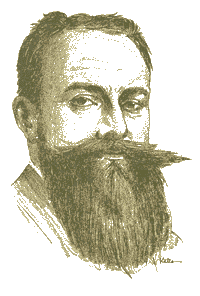 THE year 1889 saw the opening of the realistic movement in Germany. It also brought to the stage a "first" play, entitled Die Ehre (Honor) whose young author until then had been merely an obscure tutor and journalist. Honor proved itself an exception to most first plays in that it brought its author immediate European fame and an assured literary position.
THE year 1889 saw the opening of the realistic movement in Germany. It also brought to the stage a "first" play, entitled Die Ehre (Honor) whose young author until then had been merely an obscure tutor and journalist. Honor proved itself an exception to most first plays in that it brought its author immediate European fame and an assured literary position.
Hermann Sudermann was the son of a Mennonite brewer. During Sudermann's childhood his father was reasonably prosperous, but financial reversals caused the boy to be apprenticed to a chemist when he was 14. He managed to finish his studies at the gymnasium, however, and later went on to the University of Königsberg.
Sudermann had published three novels before the play, Honor, appeared. They lacked beauty and emotional power, but revealed a keen observation and a sure dramatic instinct. Probably few playwrights have had their work subjected to more bitter controversy. When Honor was first produced it was widely acclaimed, only to be just as enthusiasticaly denounced at a later date. Because of the popular and financial success of his plays, Sudermann has been frequently accused of writing for the box office.
Almost as soon as his literary success was assured, Sudermann married an authoress and gave himself up entirely to writing. He belonged, however, to the realistic school of the last quarter of the 19th century and could not adapt himself successfully to the post-war literary outlook. He continued to write, however, right up to his death, his last play appearing in 1925 and his last novel in 1928.
Probably the best known of Sudermann's plays is Die Heimat, translated under the title Magda, the name of its heroine. The powerful title rôle of this play attracted such capable actresses as Modjeska, Bernhardt, Duse, and Mrs. Patrick Campbell. This fact in itself has doubtless contributed largely to the play's success. A morose play, The Destruction of Sodom, a comedy quite out of his usual style, The Battle of the Butterflies, The Vale of Content, St. John's Fires, Storm-Brother Socrates and The Joy of Living are among the better known of his plays. Dame Care, Regina and The Song of Songs are the best known of his novels so far as English readers are concerned. Sudermann had little of the poetic beauty that characterizes the dramatic works of his famous contemporary, Hauptmann, but he was by instinct a man of the theater and a true dramatist. For nearly a quarter of a century the names Sudermann and Hauptmann dominated the German stage.
Purchase Books by Hermann Sudermann